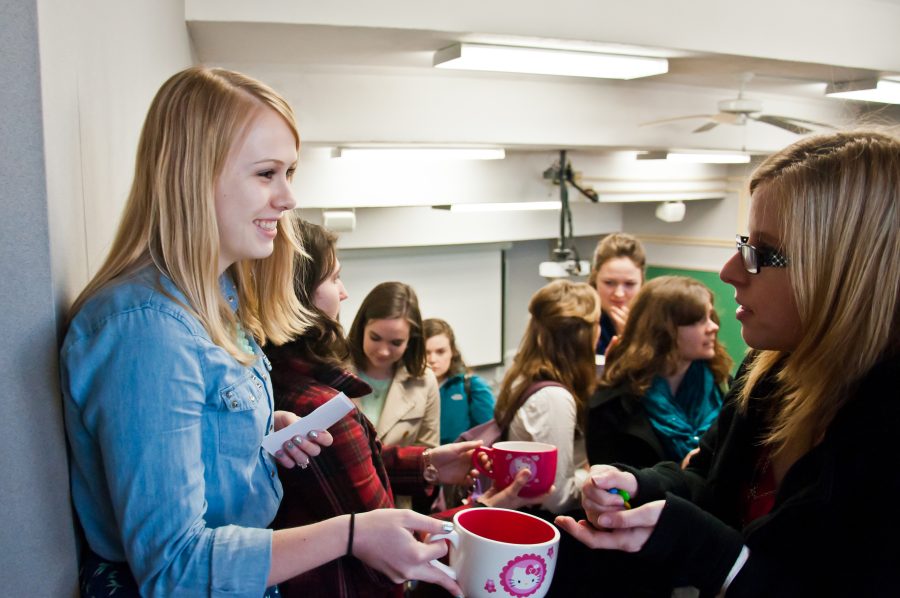If society has lost some of its luster for you, perhaps it’s because you’re viewing it from the wrong angle.
Beta Gamma Delta Patriots president and junior engineering major Matthew Arnold suggested that looking for opportunities with your society can help make society meetings more meaningful.
Arnold said his society started focusing on doing more outside of Friday society meetings.
“One trap a lot of officers fall into is thinking that society is just what happens under the 35 minutes on Friday,” Arnold said. And although that is the most recognized part of society, he said so much more can and should be going on outside those few minutes.
Trying to do one mini stag activity a month and doing a community service project or two each semester are some ways a society can grow closer than the Friday time constraint allows, Arnold suggested.
According to Arnold, society should also have a constructive element. “Having fun is a huge part of society, but it’s not the only part of society,” he said.
In Beta, Arnold said they’ve tried several ideas and programs to help inspire the guys, such as inviting faculty, staff, administrators and alumni to speak to the society and collecting money each week to donate to a charity or missionary at the end of each month. Arnold said they also are trying a new way to challenge the guys to grow in their prayer lives. Each society member received a sticker that reads “5:17,” based on the passage in 1 Thessalonians that says, “Pray without ceasing.” Arnold said he encouraged the guys to put the sticker somewhere they’ll see it and stop and pray every time they do.
Arnold mentioned that no one formula works for every society, but he gave some ideas that Beta has been trying out that perhaps will spark fresh ideas for every society’s weekly meetings.
Within the Friday society time, Arnold said Beta is trying to do more group activities. He suggests picking games that everyone can get involved in and that are easy for everyone to do from their seats. For instance, Arnold said in one society meeting they threw around a beach ball, and when someone called, “stop,” the person holding the ball had to answer either a serious or funny question that he was asked.
According to Arnold, picking ice-breaker games allows society members to meet and get to know one another.
Arnold invented one such game he calls “Number-Match-Fact-Shake.” The game involves two sets of three-by-five cards and the entire society. The sets are numbered so that every card has a match. After the guys find their match, each has to share a fact about himself and then invent a secret handshake with his partner. Then the two show off their handshake to the entire society, and a winning handshake is picked. “It was a little awkward in a good way, just to get people out of their comfort zone,” Arnold said.
In a meeting with society officers at the beginning of this semester, ISC directors, Joel Biester and Meagan Ingersoll mentioned a concept from a TED Talks video called “Functional Fixedness.” It suggests that people tend to put constraints on themselves that don’t exist in actuality. Biester and Ingersoll applied it to societies that get stuck doing things the same way all the time. Ingersoll said they challenged the officers to try to mix up the order of society or have society meeting in a different location on campus. She suggested swimming in the pool at the DFH or using the gazebo for an Alice-in-Wonderland-style “un-birthday party” (a birthday party for everyone in society at once).
Dr. Ryan Meers, chair of the Division of Communication, has been working in the background to help society succeed by equipping society officers for their leadership roles. According to Meers, a key to a society’s success is stating its purpose or mission. “When a society is clear on why they exist and what they want to accomplish in a given semester or year, they are able to move toward that goal which ultimately brings success,” Meers said.
According to Arnold, one of the best ways to get more great ideas is to actively seek feedback by conducting email surveys or asking for input in person. He said not to try to be self-sufficient as a leader, because seeking input from other people also causes them to be more engaged in society as they come up with some of the ideas themselves.
Ingersoll said a society is made of its members, and she encourages everyone to try getting involved. And she said if you don’t like something in your society or if you have a great idea, tell your officers. She remembered something a graduating senior of her society once said that caused her to want to get involved.
“If you don’t like society, well, you are society.”

























































